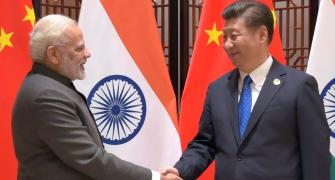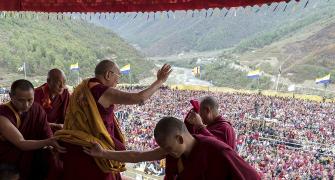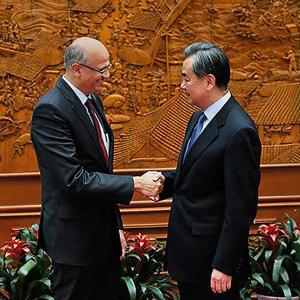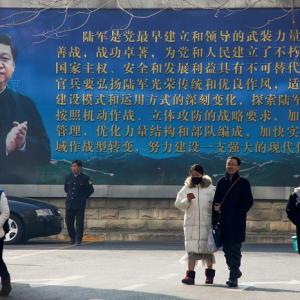'An opportunity is at hand to think big and recast the India-China relationship on a new template, which would help the pursuit of our country's dream of major power status,' says Ambassador M K Bhadrakumar.
Illustration: Dominic Xavier/Rediff.com
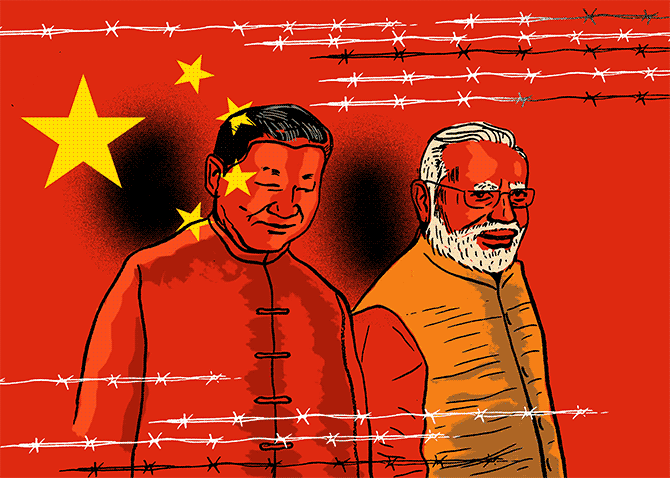
A commentary in the Chinese Communist party central committee tabloid Global Times characterised the forthcoming meeting in Wuhan on April 27-28 between Prime Minister Narendra D Modi and President Xi Jinping as an event that can be 'as significant as the one in 1988 when Chinese leader Deng Xiaoping and then Indian prime minister Rajiv Gandhi met' to set the course of bilateral relations.
The similarity is indeed there. The most obvious thing is that Modi too, unfortunately, delayed his initiative until the final lap of his 5-year term as prime minister.
Both Modi and Rajiv Gandhi acted in the aftermath of standoffs at the border, which were flaunted as 'muscularity'.
Whereas, a major initiative toward China is best undertaken by an incoming Indian prime minister in the full flush of his election victory. A catastrophe may otherwise simply turn to be the course correction.
Neither Rajiv Gandhi nor Modi cared to build a national opinion behind the China initiative, but instead preferred to tap into the 'bipartisan consensus' in the country that normalisation with China is in India's national interests.
Modi's initiative is also taking place when the regional and international milieu is fluid, as in the late 1980s.
If the Cold War was ending in the late 1980s, there are signs of a new Cold War today.
Rajiv Gandhi's visit took place when Deng was just ushering in China into an era of reforms. Modi encounters a China that has already risen.
On the other hand, Modi leads an India that is also rising rapidly and has come a long way from the economic crisis of the late eighties.
While Rajiv Gandhi's visit broke the ice and opened the vista for the development of relations with China in diverse fields (pending the border settlement), it failed to lead to a paradigm shift.
Management of differences and disputes continued to remain as the motto of the archetypal China expert in the bureaucratic establishment -- not their resolution or settlement.
A comparison with Mikhail Gorbachev's initiative toward China, which coincided with Rajiv Gandhi's, underscores that a breakthrough with China remains elusive unless there is strategic vision.
Sino-Russian relations have today acquired the character of a quasi-alliance despite the two countries having been bitter enemies who were involved in a bloody border conflict and having a painful history of territorial annexations and profound cultural and civilisational dissimilarities.
Rajiv Gandhi was fortunate enough to have his initiative followed up by P V Narasimha Rao, culminating in the historic 1994 Treaty on Peace and Tranquility at the border although Rao himself remains a non-person.
In Modi's case too, a hypothetical second term becomes imperative, for as Winston Churchill said once, 'Success is not final, failure is not fatal; it is the courage to continue that counts.'
Finally, even the three controversial areas in the India-China relationship -- territorial disputes, the situation around Pakistan and Tibet-related issues -- are no more the same as in the 1980s.
Peace and tranquility prevails on the disputed border; India is outstripping Pakistan day by day in its comprehensive national power and faces no more threats of aggression; and, Tibet-related issues are becoming a relic of a bygone era.
Thus, an opportunity is at hand to think big and recast the India-China relationship on a new bilateral, regional and international template, which would help the pursuit of our country's dream of major power status.
The seductive notions of geopolitical competition ('rivalry') are either borne out of lack of trust or Western instigation -- or a combination of both.
The good part is that Modi has a strategic vision. China is one country he knows well, having visited it several times before becoming prime minister.
Without doubt, Beijing too regards Modi as a forceful Indian leader who is a keen reformer himself and is devoted to transforming the relationship with China.
Never before in the history of the relationship has there been such an intense flow of back-to-back high-level visits as during the Modi era.
Beijing underscored the high importance it attaches to relations with India when Chinese Vice-President Wang Qishan received External Affairs Minister Sushma Swaraj no sooner than the Wuhan meeting was announced.
Here, a detour is needed.
The importance of Xi bringing in Wang at a potentially transformative juncture of Sino-Indian relations must be understood first.
Of course, Wang is known to be Beijing's foremost 'America hand' who headed China's 'strategic and economic dialogues' with the US during the depths of the global financial crisis.
However, importantly, over a 35-year career, he also distinguished himself as an economic reformer and financial technocrat.
Wang, 69, enjoys the reputation of being the Chinese Communist party's most trusted and reliable crisis manager.
But, above all, Wang is a close political associate of Xi.
Having known each other since the Cultural Revolution (both of them were forced to work in a rural commune), their careers are tied together and Wang played a pivotal role to push through Xi's audacious anti-graft campaign over the past five-years.
In the hugely significant meeting with Swaraj on Monday, Wang conveyed Beijing's expectations:
- Xi and Modi would reach 'more strategic consensus on bilateral ties and major issues of common concern';
- China's priority lies in its development;
- China seeks to establish a closer partnership of development with India;
- China desires that India plays a bigger role within the framework of the Shanghai Cooperation Organisation; and,
- China hopes to work with India 'to jointly safeguard' the multilateral trade system.
It is immaterial whether the weekend's meeting will generate a joint statement. Nor is it relevant whether there is going to be an 8-minute handshake in front of the television cameras between Xi and Modi against the backdrop of the Yellow Crane Tower, first built in 222 BC and immortalised amongst the Chinese people in the poetry of Cui Hao.
Nonetheless, tangible takeaways from Wuhan cannot be ruled out.
The nascent idea of a China-Nepal-India trans-Himalayan economic corridor may acquire habitation and a name. (Wang received Nepal's Foreign Minister Pradeep Kumar Gyawali in Beijing on April 18.)
The discussions at the 5th India-China Strategic Economic Dialogue in Beijing on April 18 may take concrete shape as projects -- in areas such as renewable energy, railways, housing and urban development, electronics, IT and so on.
However, it is the 'big picture' that remains crucial.
That is where the comparison with Rajiv Gandhi's visit to China becomes most relevant. Simply put, three decades have passed and a strategic upgrade of relations is a dire necessity.
While the overall development of ties in various fields has been significant and peace and tranquility prevails on the border, the two countries need to build a new strategic framework that faces the future.
The India-China relationship has assumed a global character.
We need no reminder that as India climbs up the greasy pole of the world order, it too will face the very same challenges that China is currently facing.
A commonality of interests does exist to provide a stable basis for bilateral relations.
With strategic unity, the two countries will be better placed to reshape the international and political order.
Beijing realises this, as evident from Wang's remarks signaling the desire for strategic consensus with India, which indeed echoed Xi's views.
In sum, Wang outlined a new type of relationship with strategic consensus on bilateral issues and common concerns at its core, which can galvanise cooperation in development, regional security and the global partnership.

